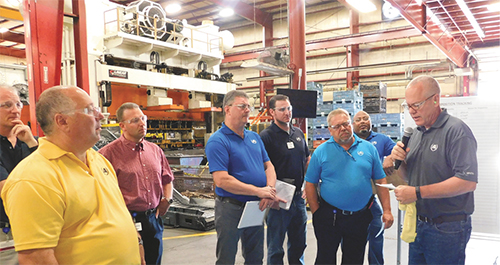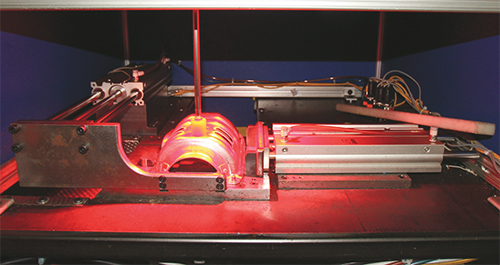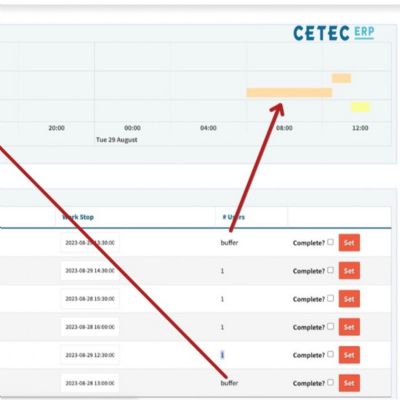Process Control Award—Pridgeon & Clay
Pridgeon & Clay, Inc., Grand Rapids, MI, received the 2018 Link Systems Award for Excellence in Process Control for developing a Poka-Yoke process to detect missing or incorrectly installed reinforcement tabs on an automotive heat shield. The company, a Tier-Two supplier to the global automotive market, is a family-owned manufacturer of complex stamped, fineblanked parts and welded assemblies.
Pridgeon & Clay’s recently formed Error Proofing Lab employs two engineers dedicated to providing innovative process improvements, cost reductions and quality enhancements. The lab performed a complete process review for the heat shield and considered alternatives for controlling the process. Visually sorting the parts could lead to human-error issues with a probability of noncompliant parts arriving to the customer, while implementing an inspection system inside of the tool would require updates requiring a higher cost than building a Poka-Yoke.
As developed, the Poka-Yoke incorporates the use of automation, pneumatics and different types of sensors, including proximity, through-beam and vision sensors. In practice, once a part exits the tab-installation die it is placed into the Poka-Yoke by the press operator, with pilots providing accurate part orientation within the gauging system. An optical touch button activates the machine and a safety-light-curtain that assures the Poka-Yoke is clear of personnel before starting.
As the inspection begins, a pneumatic hold-down places pressure to maintain part position while a proximity sensor confirms part presence. Then, a vision sensor collects an image and compares it to a stored image. If an acceptable match of the images is reached, the part passes the inspection. Next, the pilots are pneumatically removed from the part, the hold-down cylinder retracts, and the part pneumatically shuttles down a chute, passing a through-beam sensor to assure its proper exit. A PLC batch-counts each part, then the machine resets the pilots to load the next part. Inspection takes only a few seconds and, once initiated, the operator is free to load the next assembly into the die.
Should an inspection fail, the bad part shuttles to the left and down a chute, passing by a through-beam sensor into a locked box. When the PLC counts five bad parts it notifies the operator of the fault. The press will not operate until a department leader is notified to identify the problem and resets the machine. To explain the complete Poka-Yoke process, Pridgeon & Clay’s Error Proofing Lab created a training program for programming and troubleshooting the machine. Backup programs stored on the company’s computer network can be downloaded as sensors are replaced, enabling a rapid Poka-Yoke restart.
The Poka-Yoke installation and application cost $20,000, with return on investment (ROI) for this specific part approximately $25,000 annually, due to elimination of the former sort process. Over the life of the part, ROI is projected to total $105,000.
Sponsored by Link Systems in Nashville, TN, the Process Control Award recognizes innovative electronic solutions implemented by a North American manufacturing company, leading to significant quality, cost-reduction and/or productivity improvements.
Educational Institution Award—Rocklin High School
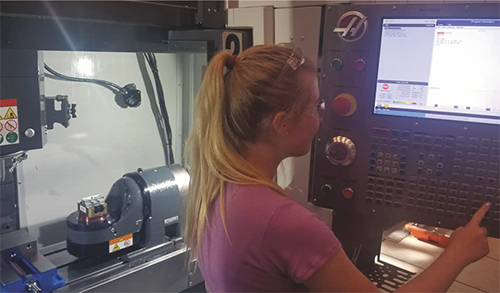 |
| Rocklin High School, through its Engineering program and fully equipped shop, has been able to help its students find gainful employment, go to college or both. Many graduates also have started their own machining companies. |
RHS has built enduring relationships with many industry partners, including Autodesk, the UC Davis Biological and Agricultural Engineering Department, Haas Automation, Kennametal, NASA, Titans of CNC, and many local shops. Titans of CNC, best known for its television show and its Titans of CNC Academy, has been the school’s most prominent partner, with RHS serving as the test bed for the academy. Recently, RHS signed a contract to produce flight-ready parts for the International Space Station through the NASA HUNCH program, becoming the third school in California certified by NASA to produce parts.
The RHS Engineering curriculum includes four courses. The first-level course introduces a broad variety of tools and technologies to the students, and they learn to safely use every piece of equipment in the shop and in the design lab. The second course addresses skill development, during which the Titans of CNC Academy is implemented and students build their CAD, CAM and CNC skills. The third course focuses on robotics, during which students design a 120-lb. robot for the international First Robotics Competition. The final course focuses on students designing and developing their own projects, or managing a variety of job-shop-style projects from internal and external customers.
In addition to the four-course sequence, RHS offers other methods for students to engage more deeply with the program. A peer-teaching option enables students to mentor other students, a teaching-assistant course targets those interested in facility operations, and a special-projects course is available for students wanting to dig into larger projects (such as go-carts).
Through the support of industry partners and local machine shops, Rocklin High School has been able to help its students find gainful employment, go to college or both. Many graduates also have started their own machining companies.
The Educational Institution Award recognizes a public or private educational institution that provides outstanding training and education services to companies in the metalforming industry. It is sponsored by Clips & Clamps Industries, Plymouth, MI, and funded by the Dul Foundation.
Innovation and Technology Award—Anchor Manufacturing Group
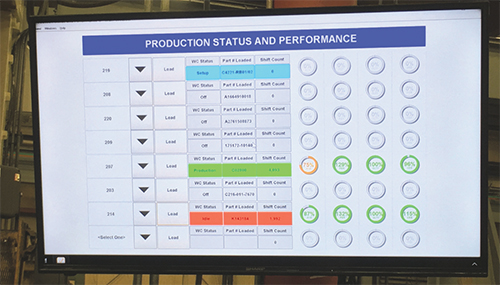 |
| Through implementation of new data-acquisition and -reporting software, Anchor Manufacturing Group’s shop-floor dashboards, unlike in the past, reflect real-time information. As a result, employees can react to issues much more quickly, and improve conditions before they spiral out of control. |
Recognizing the importance of collecting data, and the negative consequences of acting on inaccurate data, Anchor decided to implement Ignition software from Inductive Automation. Key software functions employed by Anchor include supervisory control and data acquisition, data reporting, and dashboarding. Because it can connect with a variety of device types, the software enables Anchor to capture real-time data easily, no matter what type of equipment produces the target data. And, because Ignition is web-based, Anchor easily can access data, reports and dashboards anywhere via a PC or mobile device.
The first phase of implementation tackled the human-machine interface (HMI), enabling ease of access and use for employees throughout the company, and seamless integration with Anchor’s other resource-planning and data-producing systems. Other implementations followed, allowing for capture and use of real-time data.
For example, due to the Ignition project, Anchor’s dashboards now reflect real-time information. In the past, the company used TVs and PC modules to display workcenter information such as status, count, efficiency, OEE or other key machine-performance indicators. But the information displayed was only as current as the most recent production recording. In some cases, production was recorded only once or twice per shift. As a result, displayed information offered little value because it didn’t represent the current situation of the work center. Now, dashboards and other modules used to view workcenter information relay real-time conditions to all interested parties, allowing Anchor employees to react to issues much more quickly, and improve conditions before they spiral out of control.
In the project’s testing phase, Anchor ran the HMI offline in parallel with the standard method used by operators to record production and machine statuses. On one piece of equipment, according to the data logged by an operator, machine downtime totaled 54 min. during a shift. Ignition revealed that actual downtime totaled 94 min., a significant difference.
Implementation of Ignition has benefitted operators by providing real-time performance awareness and easier status updates. Management has benefitted through enhanced data acquisition and access to timely information. Overall, the company has gained a better understanding of current performance that allows for targeting of specific areas in need of improvement, and Anchor has the ability to expand data collection and control in the future.
The Innovation and Technology Award, sponsored by Plex Systems, Troy, MI, recognizes a metalforming company that has implemented cloud technology to drive innovation from a product or business perspective or transform business operations, or leveraged it in order to scale and grow from a size or product perspective in order to emerge as a leader in its industry.
Training and Education Award—Pridgeon & Clay, Inc.
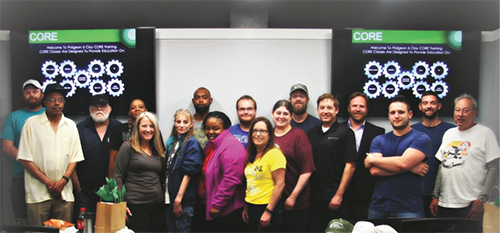 |
| These graduates of Pridgeon & Clay’s Core training program passed nine courses showcasing specific aspects and processes of the organization. Benefits obtained include individual growth and development, enhanced understanding of the business, heightened focus on quality and safety awareness, increased collaboration with different areas of the organization, positive morale, continuous improvement, and increased skills. |
Core training consists of nine basic courses showcasing specific gears of the organization—Pridgeon & Clay Business Overview, Metallurgy, Energy, Presses, Dies, Welding, Quality, 5S and Lean Thinking. Courses are taught as a two-day, seminar-style training session in the company’s renovated training room. Sessions are comprised of small groups of approximately 16 attendees from different areas, departments and shifts within the organization. Each 1-hr.-long Core course includes Q&A and a short test, with the exception of the 2-hr. Core Pridgeon & Clay Business Overview course. Training ends with verbal feedback, takeaways, Q&A and a graduation ceremony.
You Have to Enter to Win Want to recognize your team for hard work and success? Want peers to know that you have a leading-edge company? Then submit an entry for the PMA Awards of Excellence in Metalforming 2019. Details on the 2019 award-nomination process will be available shortly at www.pma.org/awards, or contact PMA at 216/901-8800.
Core training was designed for all employees, with each session including a mixture of individuals from all levels of the organization, and all shifts and roles. At the end of every Core session, executive leadership presents each graduate with a certificate and gift.
The training program has yielded many benefits, including employee growth and development, an enhanced understanding of the business, a heightened focus on quality and safety awareness, increased collaboration with different areas of the organization, positive morale, continuous improvement, and a skilled workforce.
Currently, Core is offered in Pridgeon & Clay’s Grand Rapids, MI, plant, with plans to roll it out to other company sites.The Training and Education Award is sponsored by HPL Stampings, Inc., Lake Zurich, IL, in memory of A.R. (Ray) Hedberg, a leader in employee training. As the winner of the award, Pridgeon & Clay received a $1500 cash prize, which it presented to Wyoming High School Robotics Program, Wyoming, MI. MF
View Glossary of Metalforming Terms
Technologies: Management, Sensing/Electronics/IOT, Training







